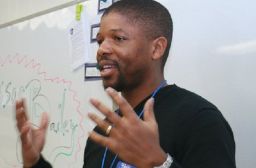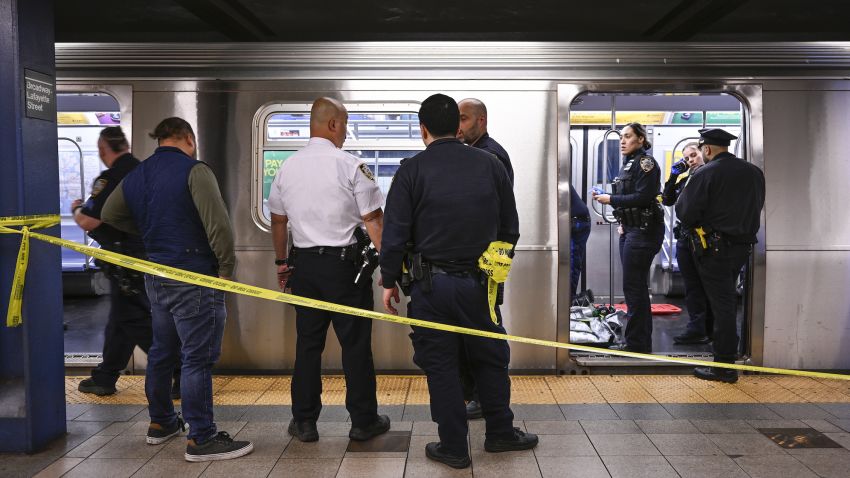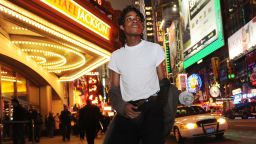Editor’s note: Issac Bailey is a longtime journalist based in South Carolina who writes for McClatchy. He will be a professor of practice at Davidson College in the fall after serving as a visiting professor at Columbia University’s School of Journalism in the spring. He’s the author of “My Brother Moochie: Regaining Dignity in the Face of Crime, Poverty and Racism in the American South.” His latest book is “Why Didn’t We Riot? A Black Man in Trumpland.” The views expressed in this commentary are his own. View more opinion on CNN.
A few weeks ago, I bought a young Black homeless man a chicken sandwich and a drink. I was on Eighth Avenue, just a few blocks down from Madison Square Garden, when I saw him holding the door open to the fast-food restaurant. He made it clear, not with words but with a quiet nod, he was hoping one of the entering customers would buy him something to eat, so I did.

I don’t know what that sandwich did for that man. For me, I felt as though my efforts amounted to a drop in the bucket. I wanted to see him, treat him as the full-complex human being he is — a man made in God’s image just as I have been made in God’s image — but instead walked away not sure whether I had belittled us both. I felt ethically impotent — knowing that I alone couldn’t lift him into a better life — and morally bankrupt, knowing that I had the resources to offer more than just a chicken sandwich and a drink.
Truth be told, I don’t know why I bought him the sandwich. A sense of duty? He caught me in a giving mood? Truth be told more fully, when I initially saw him, I considered finding another restaurant, not wanting to be disturbed by his existence. It was one of many encounters I had with the homeless I remembered when I heard what happened to Jordan Neely, a 30-year-old homeless Black man who was a well-known Michael Jackson impersonator in New York City.
On May 1, Neely boarded the F train and shouted that he was hungry, thirsty and tired of having nothing before a Marine veteran placed him in a chokehold (later saying, through his attorney, that he felt Neely posed a threat to passengers). Neely was later pronounced dead at a hospital. (The Manhattan district attorney’s office is investigating, and no charges have been brought.) Though New York City’s medical examiner said the direct cause of death was compression of the neck, I can’t shake the feeling that I was among the indirect causes.
When I got to New York in late December, I largely went along with the status quo, an acceptance of the routine dehumanization of fellow human beings, fellow human beings like Neely and an estimated 68,900 others. I wasn’t protesting in the subway station where Neely was killed, like some New Yorkers have begun doing, to raise awareness and a sense of urgency. Instead, I quickly perfected the art of rendering the homeless all but invisible, much more concerned about my own convenience — will the train get me to my destination on time? — than their plight.
I’m not new to homelessness. I grew up in the small town of St. Stephen, South Carolina, where my mom essentially turned our house into a de facto, one-stop shop for homeless and mentally ill men and women, and others down on their luck. She did that, even though we needed food stamps and free government cheese to survive. I grew up helping her help them.
As a professional journalist, I had a breakthrough story about the growing homeless population in Myrtle Beach, one of the top resort areas in the country. A photojournalist and I spent several nights over a few weeks inside a homeless shelter, and on the streets with the unhoused, getting to know them, their habits, their wants and their dreams.
Maybe that’s why I wasn’t expecting the issue of homelessness to gnaw away at me like it did in New York. But I wasn’t so much bothered by the presence of homeless people as I was bothered by my own feelings of helplessness.
It was impossible not to see them, not to be reminded that we’ve accepted an enormous amount of inequality in the wealthiest country in the world, even in the heart of the banking capital of the world. (Poverty is the fourth-leading cause of death of Americans behind only heart disease, cancer and smoking, according to researchers at the University of California, Riverside.)
I bought a young Black man a chicken sandwich and drink — but only after walking past a couple dozen other homeless people that day whom I didn’t even bother to look in the eye, like I did every day. I gave others money — dollar bills, $10s, $20s — convinced none of it made much of a difference.
One Sunday afternoon, I saw a man splayed out on the sidewalk where I had seen people let their dogs pee and defecate, his left arm bent at a 45-degree angle, his left hand operating as a pillow. His skin was as dark and leathery as my father’s.
I just walked past him, like everyone else. I think he was alive, just sleeping. I didn’t consider how he could be somebody’s father or grandfather, somebody’s uncle or cousin, somebody’s lost love. I tried not to think about what condition had led him to that sidewalk, whether it was mental illness, bad money management, alcoholism, bad timing in the stock market, gentrification, New York’s rapidly rising home prices and rent, the legacy of redlining or just bad luck. It was easier not to think about men and women like him.
I was living a contradiction and knew it. I think most New Yorkers know they are, too. Intellectually, I thought it was good, necessary even, to make all of humanity’s complexity visible. I appreciated that about New York. It’s why I disagree with US Rep. Marjorie Taylor Greene of Georgia, who proclaimed that “there’s so much crime in the city” and that it “smells bad.”
To me, a man from South Carolina, New York City doesn’t smell bad. New York smells like honesty. Homeless men and women mingling on the sidewalk with the rich and middle class is a kind of honesty often avoided where I’m from. It’s the kind of honesty that smokes out hypocrisy.
But it was hard not to feel like I was a hypocrite in New York, where it was routine to accept a large number of hurting people, including the Black woman I saw walking around in black socks on a 35-degree day and few of us even looked her way, let alone thought to help. New York may smell like honesty and present itself as such, but it has hypocritical bouts of apathy, too.
Being in New York exposed my own hypocrisy. It’s true that not once did I consider putting a homeless man in a chokehold, especially not for several minutes, no matter how uncomfortable they sometimes made me.
Neither do I want homeless people to be hidden from public view or rounded up by police, taken to jail or forced to languish in institutions. But my default response to them in real time revealed that in uncomfortable moments I would rather not have to confront the ungodly high level of decades-deep inequality we’ve allowed to take root into our society — with no end in sight — when all I want to do is get to my apartment after a long day of work.
In South Carolina, it’s not hard to avoid the presence of homeless. Though they make an occasional appearance at the stoplight near a Walmart or on the Myrtle Beach boardwalk, they are largely concentrated in areas I can avoid by refusing to stop while cruising in my Chevrolet Colorado.
In New York, at least in Manhattan where I spent much of my time, I encountered homeless people on most street corners and train stations. And yet I had in short order become conditioned to believe it was best to ignore them nonetheless.
It’s why when I think of Neely, I’m convinced he wasn’t dehumanized simply because he wore dark skin, though race may have played a role, or because he might have been in the midst of an outburst caused by a mental illness that made others uncomfortable. Before he stepped on the F train, most of us had treated him like the walking dead, an empty body life had escaped long before that day.
I’m angry that Neely was killed in front of other riders who did not appear to intervene to prevent his death. I’m just not certain my actions over the past several months were much better than theirs.
All I did was buy a homeless Black man a sandwich and a drink and gave others a few dollars to feel better about my daily acceptance of their routine dehumanization. I didn’t kill Neely. But I didn’t do much to save him, either.






